Labs
- Dermatology
-
Psoriasis Center of Research Translation (CORT)
Funded by the National Institute of Arthritis and Musculoskeletal and Skin Diseases, this center seeks to advance knowledge of Psoriasis by making extensive use of health informatics and research and combining it with data-mining and advanced analytics.
Center for Medical Mycology
The Center for Medical Mycology serves as a reference for clinicians and the pharmaceutical industry in the study of fungal diseases, as well as performing research on fungal pathogenesis, virulence, and biology.
Skin Diseases Research Center
The Skin Diseases Research Center seeks to provide value to investigators, through focus on uniting basic and translational science, as well as enhance their career development and provide a wide variety of resources.
The Yoshida Lab
The Yoshida Lab uses a multifaceted research approach of in vitro biochemical assays, in vivo mouse models, human melanoma specimens and more to improve therapies for melanomas which cannot be removed by surgery.
- Endocrinology
-
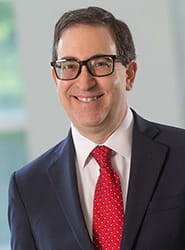
Seth Field, MD, PhD
The goal of the Field lab is to use discoveries in fundamental biology to fuel the development of new approaches to treat human disease and provide insight into the mysterious organelle, the Golgi.
- Ear, Nose & Throat
-
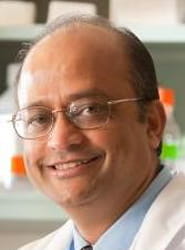
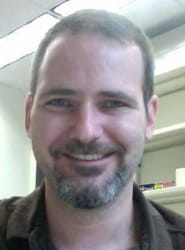
Martin L. Basch, PhD
The Basch Lab uses mouse embryo as a model system to understand how the inner ear forms. The lab studies how the different cell types in the cochlea interact with each other during embryonic development. The lab goal is to apply the lessons learned from normal development towards regenerative therapies in cases of congenital deafness and age-related hearing loss.
- Harrington Discovery Institute
-
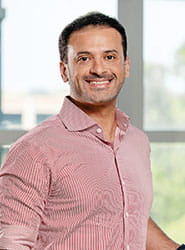
Atul Chopra, MD, PhD
The Chopra lab focuses its research in the field of energy homeostasis and metabolic disease. Through the assessment of humans with genetic defects in the processing of energy, the lab works to identify new genes and pathways that have escaped attention so far. Its goal is to identify novel processes and paradigms within the realm of energy homeostasis using human and mouse genetics as well as cutting edge molecular biology.

Seth Field, MD, PhD
The goal of the Field lab is to use discoveries in fundamental biology to fuel the development of new approaches to treat human disease and provide insight into the mysterious organelle, the Golgi.

Andrew Pieper, MD
The Pieper lab strives to identify and pursue important biological insights into neuropsychiatry, with particular focus on neurodegeneration in disease, injury, and normal aging. The ultimate goal is to improve human brain health through translational basic science leading to new therapies for patients suffering from currently incurable or difficult to treat neuropsychiatric disorders.

Jonathan Stamler, MD
The Stamler lab pioneered the field of S-nitrosylation-mediated protein control, a fundamental mechanism of cellular regulation and signaling that operates across phylogeny and cell type. It is currently developing first in-class agents that modulate S-nitrosylation in a tissue and target-specific manner, promising new treatments for human disease.
- Heart Lung Blood (HLB)
-

Cody Rutledge, MD, PhD
The Rutledge lab explores mitochondrial and metabolic changes in heart disease, specifically mitochondrial and metabolic changes related to ischemic heart disease, focusing on cardiac arrest and myocardial infarction models. The ultimate goal is to develop mitochondrially targeted therapies to improve outcomes after ischemic injury.
- Oncology
-
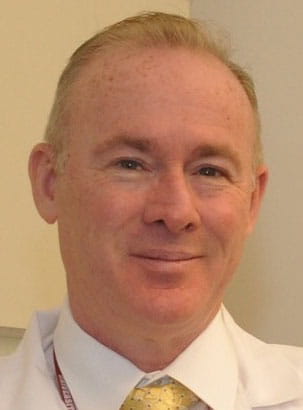
James Driscoll, MD, PhD
The Driscoll Lab focuses its research on increased understanding of the biology of plasma cells under physiologic and pathologic conditions as a means to improve human health. Over the past decade, they focused their laboratory and clinical research studies on the plasma cell malignancy multiple myeloma (MM).

Alex Y. Huang, MD, PhD
The Huang Lab was established in 2006 and was dedicated to the scientific discovery of onco-immunology and basic cellular and molecular principles underlying proper functioning of the immune system. Our goal is to provide clinical translational opportunities in immunotherapy of cancer, with a focus on malignancies that affect children, teenagers and young adults as well as common adult cancers.
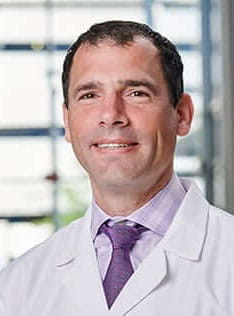
Jordan Winter, MD
The Winter lab studies basic, translational, and clinical aspects of pancreatic cancer with a principal goal to discover new and effective therapies. We seek to understand how pancreatic cancers develop resistance to standard chemotherapies. Additionally, we are interested in understanding how pancreatic cancer is able to successfully adapt to the extremely harsh metabolic conditions that are present throughout the tumor microenvironment such as hypoxia and low nutrient levels.
- Ophthalmology
-
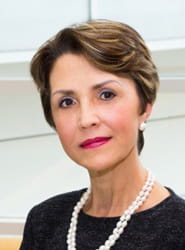
Irina Pikuleva, PhD
Vice Chair of Research
Carl F. Asseff, M.D. Professor of Ophthalmology
Director of the Visual Sciences Research Center
Case Western Reserve University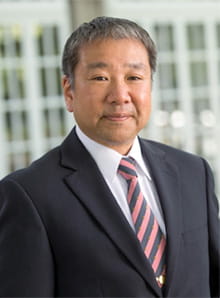
Shigemi Matsuyama, DVM, PhD
Associate Professor
Ophthalmology and Visual Science (Primary)
Hematology and Oncology, Department of Medicine
Department of Pathology
Department of Pharmacology
General Medical Science
Case Western Reserve University
Case Comprehensive Cancer Center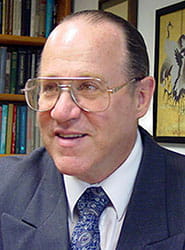
Robert Salomon, PhD
Mabery Professor of Chemistry and Ophthalmology, Case Western Reserve University
- Pathology
-
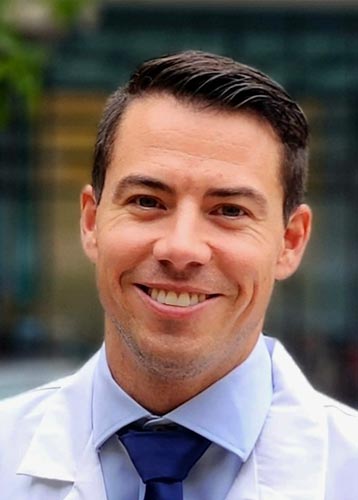
Ty Miller, MD, PhD
The Miller Lab thrives on synergy created by bringing together diverse experts and perspectives to push the boundaries of science. It is committed to educating and mentoring the next generation of leaders in science and medicine by fostering a collaborative workspace that bridges research with clinical practice.
- Pediatric
-
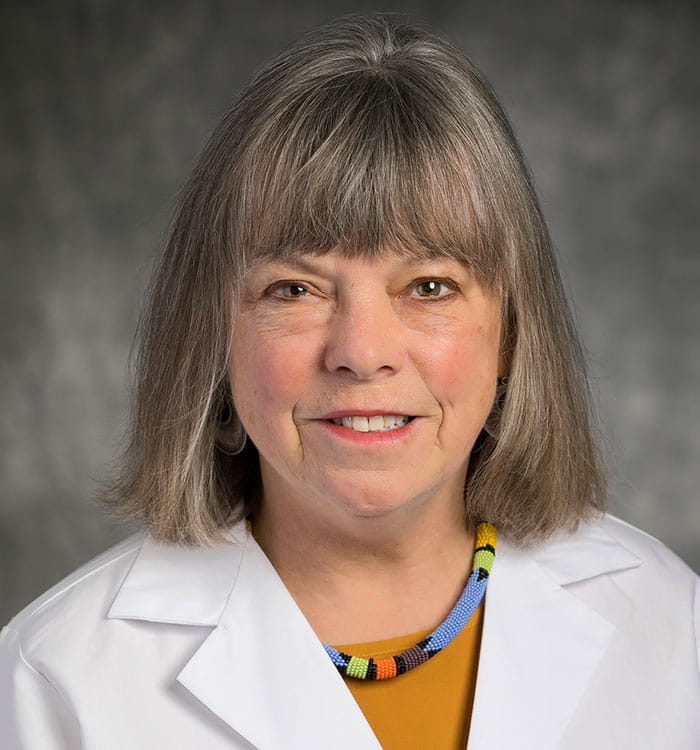
Cynthia Bearer, MD
The Bearer Lab examines how environmental factors affect neurodevelopment in preterm infants. Currently, Dr. Bearer's laboratory is focused on the effects of ethanol, bilirubin and hypoxia-ischemia on brain development and how these neurotoxic exposures inhibit the function of lipid rafts. Lipid rafts, specialized micro domains of the plasma membrane, are critical for cell-to-cell signaling in cerebellar development and brain stem function, including the control of respiration.

Samudragupta Bora, PhD
The Bora Lab’s primary area of research expertise is the neurodevelopmental follow-up of high-risk neonates in both high-income and low- and middle-income countries. Research studies span two core themes: 1) develop a better understanding of the long-term neurodevelopmental outcomes of high-risk neonates, and 2) discover the independent and interdependent roles of neurological and social factors underlying these outcomes.

Alex Y. Huang, MD, PhD
The Huang Lab was established in 2006 and was dedicated to the scientific discovery of onco-immunology and basic cellular and molecular principles underlying proper functioning of the immune system. Our goal is to provide clinical translational opportunities in immunotherapy of cancer, with a focus on malignancies that affect children, teenagers and young adults as well as common adult cancers.
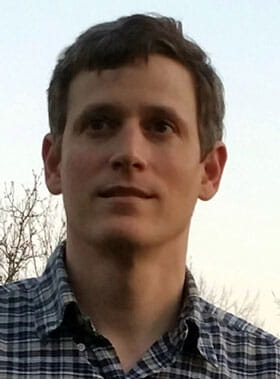
Michael W. Jenkins PhD
The Jenkins lab develops and applies novel biomedical optics tools and techniques for investigating congenital heart disease and diseases of the peripheral nervous system. The primary optical tools are infrared control of excitable tissues (optical pacing, infrared neuromodulation), optical coherence tomography (OCT), and microscopy (light-sheet microscopy, optical mapping).
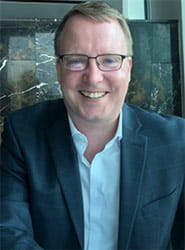
Peter M. MacFarlane, PhD
The MacFarlane Lab focuses its research around microglia (immune cells of the central nervous system) and components of the extracellular matrix (the structural network of soft tissue) and how they contribute to respiratory system development. A particular conceptual focus of his research involves understanding the vulnerability of the respiratory system to exogenous stressors such as hypoxia and inflammation, particularly during critical windows of development.
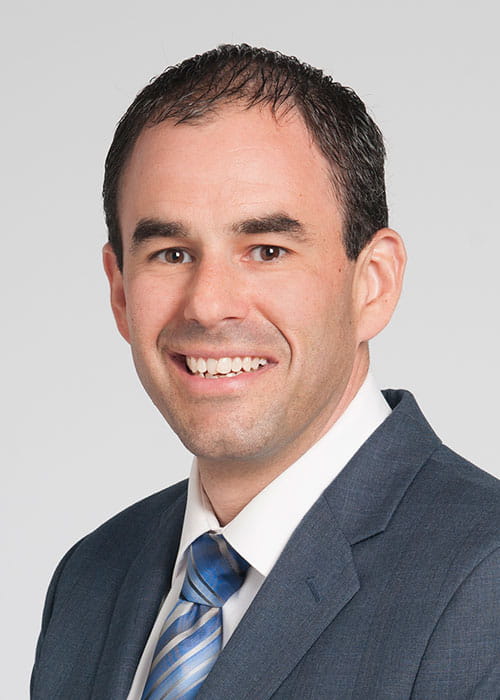
Timothy J. Mead, PhD
Timothy J. Mead, PhD is a trained developmental and molecular biologist with a keen focus on cardiovascular development and disease. His research centers on how changes in the extracellular matrix results in dysfunctional heart development and resulting congenital heart defects. Dr. Mead utilizes mouse models of congenital heart disease, biochemistry and proteomics to understand the molecular mechanisms underlying these diseases towards the development of therapeutic approaches. His current research focus is on the novel concept of inhibiting a protease that remodels fibrillin microfibrils in the aorta in an effort to identify a therapeutic for Marfan syndrome.
- Surgery
-

Jordan Winter, MD
The Winter lab studies basic, translational, and clinical aspects of pancreatic cancer with a principal goal to discover new and effective therapies. We seek to understand how pancreatic cancers develop resistance to standard chemotherapies. Additionally, we are interested in understanding how pancreatic cancer is able to successfully adapt to the extremely harsh metabolic conditions that are present throughout the tumor microenvironment such as hypoxia and low nutrient levels.
- Urology
-
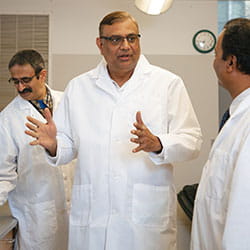
The James and Eillen Dicke Urology Research Laboratory
Sanjay Gupta, PhD
Professor & Endowed Chair, Department of Urology, School of MedicineDr. Sanjay Gupta’s research involves basic, translational and clinical areas of focus. He has made ground-breaking contributions to the fields of cancer biology, epigenetics and pharmacology, in particular, identification of biomarkers and targets, development of prognostic models and application of small molecules for prevention and therapy of cancer. His recent interest is on development of new technologies based on artificial intelligence and bio-printing based cancer model systems.
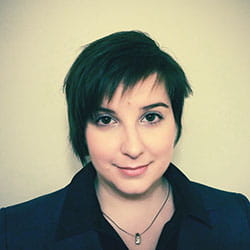
Grabowska Lab
Magdalena M. Grabowska, PhD
Assistant Professor, Department of Urology, Case Western Reserve UniversityThe Grabowska Lab focuses on genitourinary conditions like prostate cancer, benign prostatic hyperplasia, and bladder cancer. The team of researchers uses patient tissues, pre-clinical models, and cell lines to understand how these conditions develop and acquire therapeutic resistance to standard therapies. We collaborate with clinical, basic, and translational researchers to create an interdisciplinary research program to better understand these diseases with the goal of improving patient outcomes.
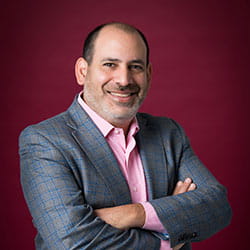
Hijaz Lab
Adonis Hijaz, MD
Vice Chair Academic & Research, Urology InstituteDr. Adonis Hijaz is the Lester Persky Professor of Urology at CWRU and is a specialist in female pelvic medicine and reconstructive surgery. Over the last 15 years, he has conducted clinical, basic science and translational research on the topic of urinary incontinence. The focus of the his research Laboratory at CWRU has been on the study of the mechanisms and pathophysiology of stress urinary incontinence (SUI) with focus on the role of mesenchymal stem cells (MSCs) in the treatment of SUI. Research conducted in his laboratory has also investigated the role of stem cell homing chemokines in the treatment of SUI. Dr. Hijaz’s laboratory has specific strength in development of small animal models of urinary incontinence with an emphasis on models that investigate mechanisms of childbirth injury to the urethral continence mechanism. The goal of this research to harness the knowledge of mechanisms of recovery in the development of pathophysiologically-based treatment alternatives that emphasizes early intervention. In addition to the former field of research, the laboratory has collaboration with departments of biomedical engineering and Mechanical and Aerospace Engineering. The collaboration has focused on innovative solutions for pelvic floor and incontinence repair with next generation biodegradable biotextile material. This collaboration has received funding from local, state and federal sources to validate and further develop the technology. In the most recent years, the team has been investigating he role of immune-regenerative macrophages in the treatment SUI. The laboratory has been supported by NIH and by the Lester Persky Endowment.
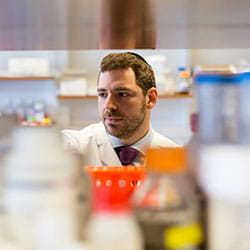
Shoag Research
Jonathan Shoag, MD
In an effort to develop precision tools for cancer care, Jonathan Shoag, MD conducts translational and clinical research focused on bringing large data, genomic sequencing and novel AI and statistical techniques for better patient outcomes. More specifically, Dr. Shoag’s objective is to identify drugs that have activity against the normal prostate and can be used to understand and treat prostate cancer. The Damon Runyon Cancer Research Foundation supports Dr. Shoag’s novel approaches to apply novel statistical and machine learning approaches on large scale clinical data to discover new therapies and pathways important in prostate cancer. He will then test these therapies in genetically engineered and patient-derived prostate cancer models. Identifying active drugs against prostate cancer that are already FDA-approved or have been previously studied in clinical trials for other cancers can aid in understanding prostate cancer biology and can rapidly benefit patients with advanced disease.


